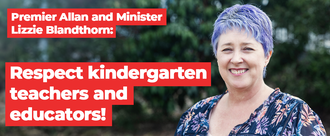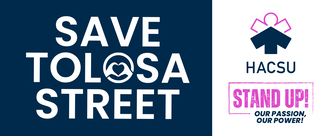- Featured
- Asylum Seekers and Migrants
- Climate and Environmental Justice
- Disability Justice
- Economic Justice
- Education
- First Nations Justice
- Health and Medicare
- International Solidarity
- LGBTIQA+ Rights
- Media and Arts
- Occupational Health and Safety
- Public Services
- Public Transport
- Racial Justice
- Social Justice
- Women's Rights
- Workers' Rights
- More
-
Fair Bargaining Rights for Victorian Catholic Education Workers!Our colleagues across Australia have secured vital improvements to pay and conditions because they have access to the industrial rights that our employers want to deny us. The VCEA is seeking a ‘cooperative’ multi-employer bargaining process, but we’ve seen what that really means: dysfunction and massive delays, a process stacked against us, and deeply unfair constraints on our ability to effectively campaign for a fair and timely outcome. When we last took large-scale industrial action (mirroring protected action taken by government school staff), Catholic employers sought injunctions against our union and individual members were intimidated with the the threat of fines. If we commence bargaining under their so-called ‘cooperative’ model, employers could use this to attempt to prevent us from successfully applying for a Single Interest Authorisation for many months, locking us out of our fundamental industrial rights during the most important stages of bargaining. Employers could apply for that Authorisation now, allowing good faith bargaining to commence this year without denying basic rights to over 30,000 hard-working staff. The VCEA’s refusal to do so isn’t just unfair, it contradicts core Catholic values of dignity, justice, and the right to take industrial action when needed. We must stand up for fair bargaining! Read more here5,910 of 6,000 Signatures
-
Homes For AllAll the evidence from experts is clear. We need to: • Massively increase the supply of housing; • Boost social housing; • Scale back negative gearing and reassess tax breaks for wealthy landlords; • Develop nationally consistent rental laws that set consistent standards and protect renters' rights; and • Allocate housing for key workers. Home ownership is currently out of reach for most Australians – but that doesn’t need to be the case.4,249 of 5,000 Signatures
-
Justice for Kumanjayi WhiteWarlpiri people and supporters are mobilising for justice and for systemic change in response to the horrific death in custody of Kumanjayi White. These immediate demands stem from deep grievances about the conduct of the police investigation so far are an important stepping stone towards justice. Warlpiri leader Ned Hargraves explains the circumstances of Kumanjayi White's death: "The young Warlpiri man who died in police custody in Coles in Alice Springs on Tuesday May 27 is my Jaja (grandson). I am angry and frustrated that yet another one of our young men has lost his life at the hands of the police. We know that he was held down by two police until he lost consciousness and perished. But at the moment we are in the dark about what really happened. It is disgraceful that police are already putting out stories that portray my jaja as a criminal. They are trying to run him down. We demand they stop spreading stories and show some respect. Family representatives need to see all available footage of this incident immediately - both CCTV and body cam so we can understand what happened to my Jaja - but so far they are refusing to grant this. We need an investigation completely independent of police This young man was living away from his community, in town, in supported accommodation because of his disabilities and he was very vulnerable. He needed support and not to be criminalised because of his disability. What are the police doing using such force on a vulnerable young man in a supermarket? Did they even try to de-escalate? This happened on the 5th anniversary of the death of George Floyd - during Reconciliation Week - but my people have to confront another death in custody. My people are being routinely brutalised by police. We are going into jail in record numbers - men, women and children alike. We are suffering badly under the shadow of the NT Intervention and under a Country Liberal Party government in the NT that is making many racist policies against us - sending more people to jail and threatening our sacred sites. This is making racists more confident to attack us. We have put forward many solutions to improve Warlpiri relations with the justice system that continue to be ignored. The death of my Jaja needs to be a moment when we come together to fight for change. Enough is enough! We need justice!"6,207 of 7,000 Signatures
-
Sanctions, Recognition & Peace for PalestineWe call for an end to the occupation of Palestine and a just and sustainable peace in accordance with UN Security Council resolutions, including the removal of illegal settlements, the withdrawal of Israel from all Palestinian lands along with the dismantling of the separation wall. We call on all countries to recognise, without delay, Palestine as a sovereign state with East Jerusalem as its capital. This will confirm the right of the Palestinian people to self-determination in a free and independent Palestine. Implementing a two-state solution is the path to lasting peace, safety and security for both the peoples of Israel and Palestine.12,097 of 15,000 Signatures
-
Respect kindergarten teachers and educators!The Premier cannot say Victoria is the ‘education state’ and promise parents fee-free 3 and 4-year-old kindergarten without the workforce to deliver it – and that can’t happen without investing in decent wages and working conditions. Delivering for teachers and educators who work in Victoria’s kindergartens means delivering for the children they educate. Everyone knows that for children to succeed at school they require access to high-quality kinder delivered by teachers and educators that are supported, respected and valued. Children benefit the most when their early childhood teachers and educators are well supported, paid a decent wage, and want a long term career in early childhood education. Supporting the teachers and educators who work in Victoria’s kindergartens will benefit children, who will be ready to start school; and parents, who will know their child is getting the best start to their education. - Tracey Webb, Early Childhood Educator and AEU Member10,661 of 15,000 Signatures
-
Protect Freedom of Expression at UTS: Stop the Changes to the Campus PolicyWe reject the assumption that indoor protests are inherently unsafe. Staff and students have a long-standing record of cooperating with UTS to manage risks at protests, including ensuring access to buildings and emergency exits. A blanket ban is not a safety measure - it is an attempt to suppress dissent. Universities are meant to be places of free inquiry, challenge, and robust debate. Political protest has always been part of that tradition. UTS has legal and ethical responsibilities to protect freedom of political expression under: • The Higher Education Support Amendment (Freedom of Speech) Bill 2020 • The Enterprise Agreement between UTS staff and management • Implied rights of political communication under the Australian Constitution The current protest policy already allows UTS Security to manage risks appropriately. Clause 4.57, for example, enables the university to identify suitable spaces for demonstrations and implement safety plans. This balanced approach works. Replacing it with a prohibitive, one-size-fits-all ban threatens the ability of students and staff to protest openly and safely, and opens the door to arbitrary and punitive responses to any political expression inside university buildings. Students and staff will continue to protest when injustice occurs. But driving protest underground, or creating vague restrictions, makes it more dangerous for everyone. Cooperation is the safer approach. We stand for a UTS where safety and freedom of expression can coexist. We urge the university to work with, not against, the campus community to uphold these principles.153 of 200 SignaturesCreated by President, UTS Students' Association
-
Save SA Public Sector PsychologyPublic psychologists provide specialist assessment and treatment to people across the lifespan. We are essential for: 1. learning assessments, determining special school placements, behavioural consultancy, and mental health support in schools 2. developmental and autism diagnostic assessments in hospitals 3. mental health assessment and treatment for children, adolescents, adults, and older persons in hospital and the community 4. psychological and neuropsychological assessment and treatment in hospitals and community settings, for physical health and rehabilitation. 5. child protection and forensic assessments for children and young people where there is suspected abuse and/or neglect 6. forensic assessments in juvenile justice and adult corrections 7. psychological support for perinatal, infant, and child and youth community health Imagine not having psychologists in the SA public sector to meet these critical needs! South Australians don't deserve to miss out on specialist care. Instead, they are being forced to go without or to access psychological assessment or treatment from the private sector which we know is unaffordable for many. Without our vital psychological services in the public sector, there will be even more pressure on the health, education, and child protection systems, and it places vulnerable children, adults, and families at further risk. There will be more children on wait lists for diagnostic assessments while missing out on important early intervention, and vulnerable adults will not have the care at the time they need it and fall into acute mental health crisis. SA cannot afford to increase ramping pressure or allow our children to fall behind. SA psychologists feel privileged and honoured to serve the public; but now we ask for your assistance and support to keep our workforce strong and thriving so that we can continue to help you in the future. Join the campaign. Sign the petition and let the SA Government know that you want them to respect psychologists and save public psychology.4,080 of 5,000 SignaturesCreated by South Australian Psychologists Association
-
Sunraysia Workers Stand Up for WorkCoverAs unionists, we know that WorkCover is in need of reform. We also believe this is a moment where we can make greater changes to improve the safety of Victorian workers, address the root causes of these injuries and have a system that is responsive to their medical needs. These changes have hurt workers - sign the petition to call on the Victorian Government to reverse these changes.11 of 100 SignaturesCreated by OHS Reps
-
Save Tolosa StreetThe Tolosa Street Adult Mental Health Service facility provides a crucial service to the community by assisting Tasmanians with mental health conditions to build independent living skills and focus on their recovery, employing a range of health professionals including respite support workers, nurses, cleaners and social workers.373 of 400 SignaturesCreated by Health and Community Services Union TAS (HACSU)

-
FAIR DEAL NOW for Smith’s Chips & Doritos Workers!The brutal reality is PepsiCo made $2 billion in revenue and $106 million in profits in 2023 alone. Yet they refuse to share even crumbs with the workers who make their success possible. South Australian workers who produce and package Doritos and Smith’s Chips are paid 12% less than their Queensland colleagues for doing the exact same work, and even though the product is the same price nationally. Same rate, each state - is that really too much to ask from a billion-dollar global empire? A level 3 worker would need to work for 740 YEARS to earn what global CEO Ramon Laguarta pockets in a single year, $49.3 million. Send a message to the PepsiCo CEO to end the greed and respect South Australian workers with a fair deal!2,186 of 3,000 SignaturesCreated by United Workers Union
-
Community and Disability Workers are standing together for a 4.5% pay increaseLiving costs are still rising - and too many SACS workers are being forced to cut back, dip into savings, or delay essential expenses. That’s why the ASU is putting forward a case for an 4.5% increase in 2025. And your support helps show just how urgently this is needed across our sector. In the past few years alone, union members have campaigned for – and won – above-inflation increases for Award workers. These wins didn’t come from nowhere. They came from workers like you, standing together and demanding better. But big business and the Coalition have made it clear: they don’t back wage increases for workers like you. So once again, we’re taking a stand and making the case for a real pay rise. In 2025, we’re pushing for a 4.5% pay rise. Add your name to support a real pay rise. Together, we’re winning better pay.1,473 of 2,000 SignaturesCreated by Australian Services Union
-
Winning better pay together - ASU members are calling for a 4.5% pay increaseOur recent cost-of-living survey showed what you already know: workers are under real pressure. Essentials like groceries, rent and fuel are taking a bigger bite out of household budgets. This is why the Annual Wage Review matters. In the past few years alone, union members have campaigned for – and won – above-inflation increases for Award workers. These wins didn’t come from nowhere. They came from workers like you, standing together and demanding better. But big business and the Coalition have made it clear: they don’t back wage increases for workers like you. So once again, we’re taking a stand and making the case for a real pay rise. In 2025, we’re pushing for a 4.5% pay rise. Add your name to support a real pay rise. Together, we’re winning better pay. Sign the petition for a 4.5% pay rise today.721 of 800 SignaturesCreated by Australian Services Union

.png)






.png)



